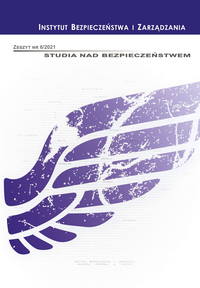No. 6 (2021)
From the Editor
Dear Readers,
We are passing into your hands another, already the sixth issue of "The study of Security". In their reflections, the authors of the publication referred to various contexts of security. The starting point in their analysis became the scientific understanding of security, which certifies that certain problems find their justification in science. Thus, the authors identified, explored and diagnosed and forecasted security.
Volume six opens with a chapter entitled "The military-political potential for maintaining peace and stability through global governance structures (using the UN as an example)." The article presents the effectiveness of global governance structures in the area of security against the background of the growing confrontation between powerful geopolitical players, tensions between rich and poor countries, and the struggle for resources and markets. Problems that negatively affect the effectiveness and success of peacekeeping operations and trends in the further development of peacekeeping activities of UN forces are identified. The authors of the article note that the security system needs to be reorganized and improved through the expansion of UN peacekeeping forces and the creation of new joint military formations on a permanent basis.
Elitsa Stoyanova-Petrova, in an article titled. "Components of military organizational culture affecting individual performance in the training process" draws attention to the problem of the influence of military organizational culture on the individual performance of students. The subject of the article is the identification of some components of military organizational culture that affect individual performance in the training process, which is particularly related to motivation for training and military activities. The author drew the reader's attention to the subject of the empirical study, which is trainees in military science specializing in the organization and management of military units at the tactical level at the National Military University in Bulgaria.
"GIS information in the stages of a crisis event in the coastal zone of Rowy, Ustka and Darlowo," by Krzysztof Rogowski, is a presentation of the adverse phenomena that can occur during a storm in connection with the noticeable climate change. Emphasis is placed on presenting methods of forecasting and mitigation. The possibility of using a geographic information system is described, with particular emphasis on the situation of extreme weather phenomena - storms - in the coastal areas of Rowy, Ustka and Darlowo.
The article titled: "The use of activation technique - MIND MAPPING - in the implementation of the course: economic security" by Anna Rychla-Lipinska presents the activation technique - MIND MAPPING. The author presented a map made by the students of the National Security major in the final class of the course "Economic Security".
In the current issue you will also find issues of military security aspects. In the article: "The system of countering potential threats to Ukraine's military security against the background of changes in geopolitical positions and geostrategic tasks" by Larysa Novak-Kalyayeva. The author considers the problems of interaction between the main components of the Security and Defense Sector of Ukraine: the security and defense forces, both in peacetime and war. The article analyzes legal documents defining the tasks and purpose of the Armed Forces and outlines their functions, which are reflected in new strategic documents.
Ivan Bryhadyr, Iryna Panova, Volodymyr Strelianyi in the article titled: "Transition from internal combustion engines to electric engines - legal and organizational dimensions" examined current trends in motor transport, threats to human ecological safety arising from the introduction of new technologies, i.e.: collection of used batteries from battery-powered vehicles as hazardous waste and the problem of their uniform disposal; redistribution of emissions from transport operations, but not their reduction. In addition, the authors drew attention to the legal basis of the mechanisms for overcoming the problems studied both in Ukraine and on the example of other countries of the problem raised.
Hryhorii Dzhahupov in the article: "Factors Influencing Cross-Border Security" analyzes the issue of security with a particular focus on public security and social security. The author analyzed the presence of a large number of factors affecting the development of the state, its internal structure, the development of society, the economy, the level of crime, which significantly affect cross-border security, and thus the standard of living of various people - groups and individuals.
In the conducted constations, attention was paid to the protection of human rights and freedoms, the functioning of public administration on the example of Ukraine. The purpose of the article by Yevheniy Lipiy, Mykola Komziuk, Anna Komziuk titled: "Implementation of the principles of good governance in the practice of public control" is to draw attention to the proper performance of its functions, which involves the implementation of European principles and standards of good administration.
An analysis of developments around Ukraine gives every reason to claim that today Ukraine is dealing with a form of military operations, which is hybrid warfare. Svitlana Koval, in an article titled: "Informational and psychological confrontation in hybrid warfare," analyzes the informational and psychological components of modern hybrid warfare.
In the article titled: "International Juvenile Justice," Olena Zavorina makes a legal analysis of international standards for interrogating juvenile suspects. The analysis refers to the procedural order and tactics of interrogating a juvenile, which are defined in international law. The author pointed out the criteria and detailed rules of interrogation, as well as the requirements for the procedural order.
The articles included in the publication are a description of the results of research conducted individually by the individual Authors and, for the most part, capture the essence of current security problems both at home and abroad. The compiled security anthology is the result of mutual scientific inspiration of the members of the editorial committee and the Authors of the presented articles.
We cordially invite Readers to reach for the sixth issue of our journal.
Editorial Board
